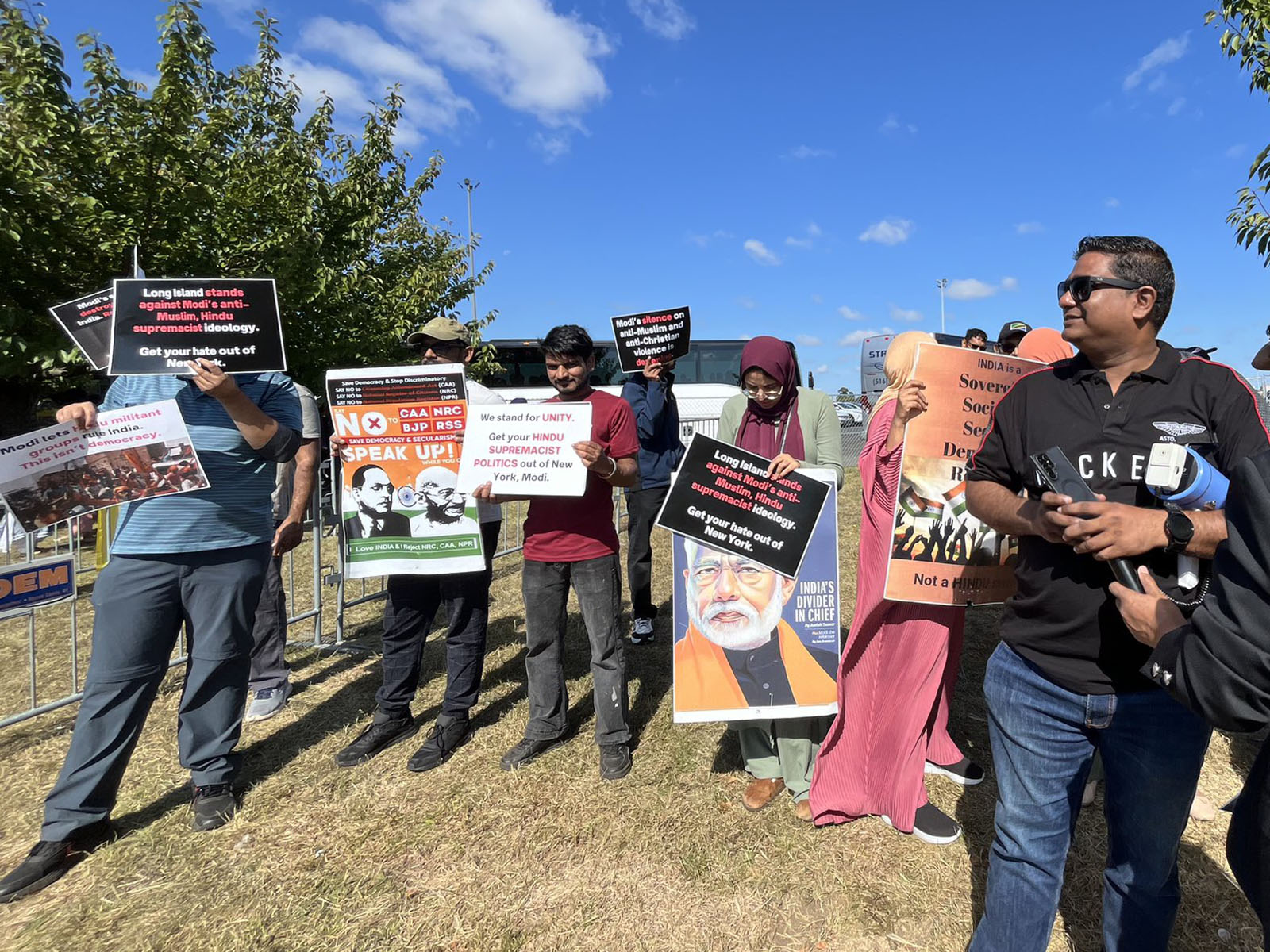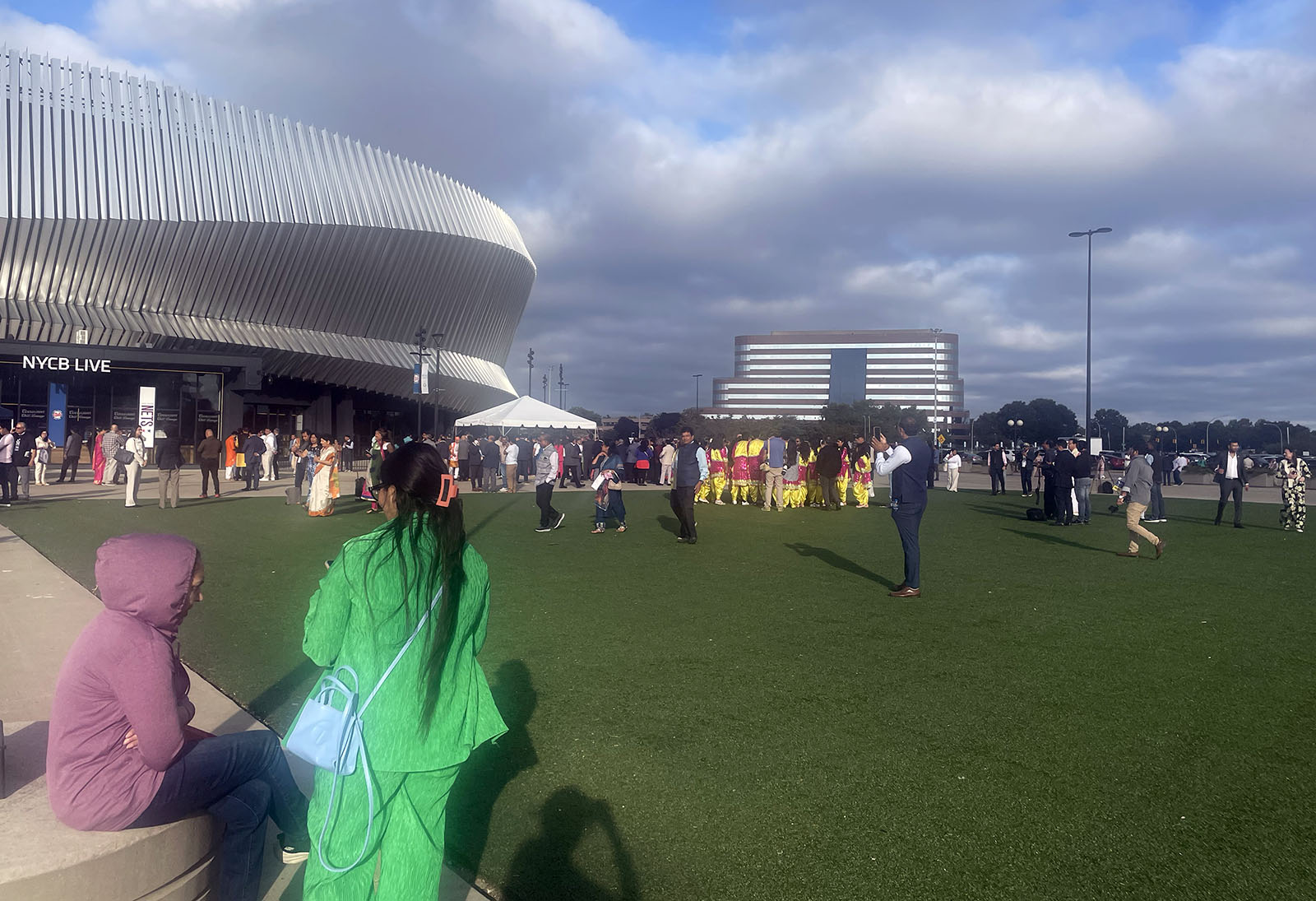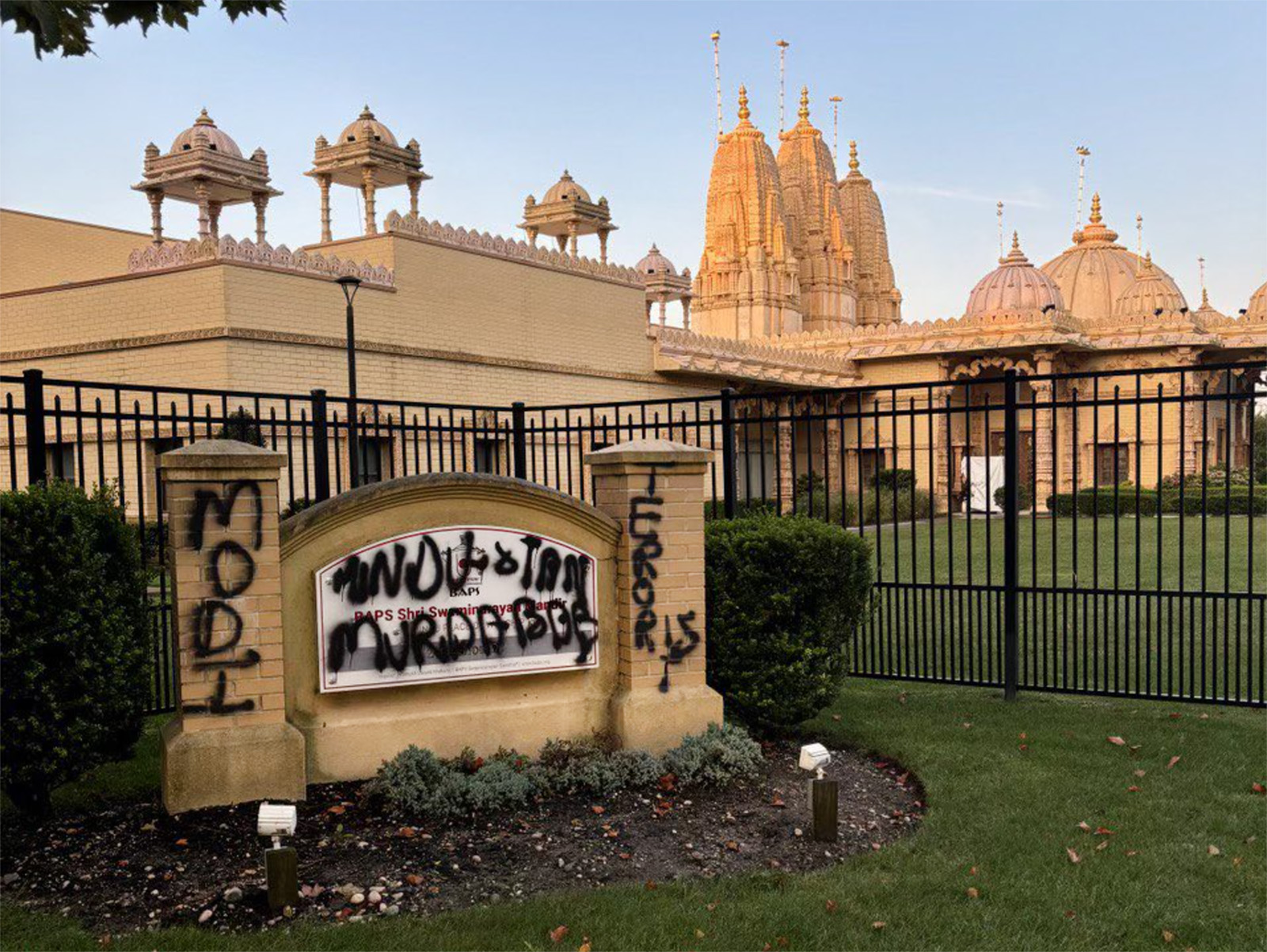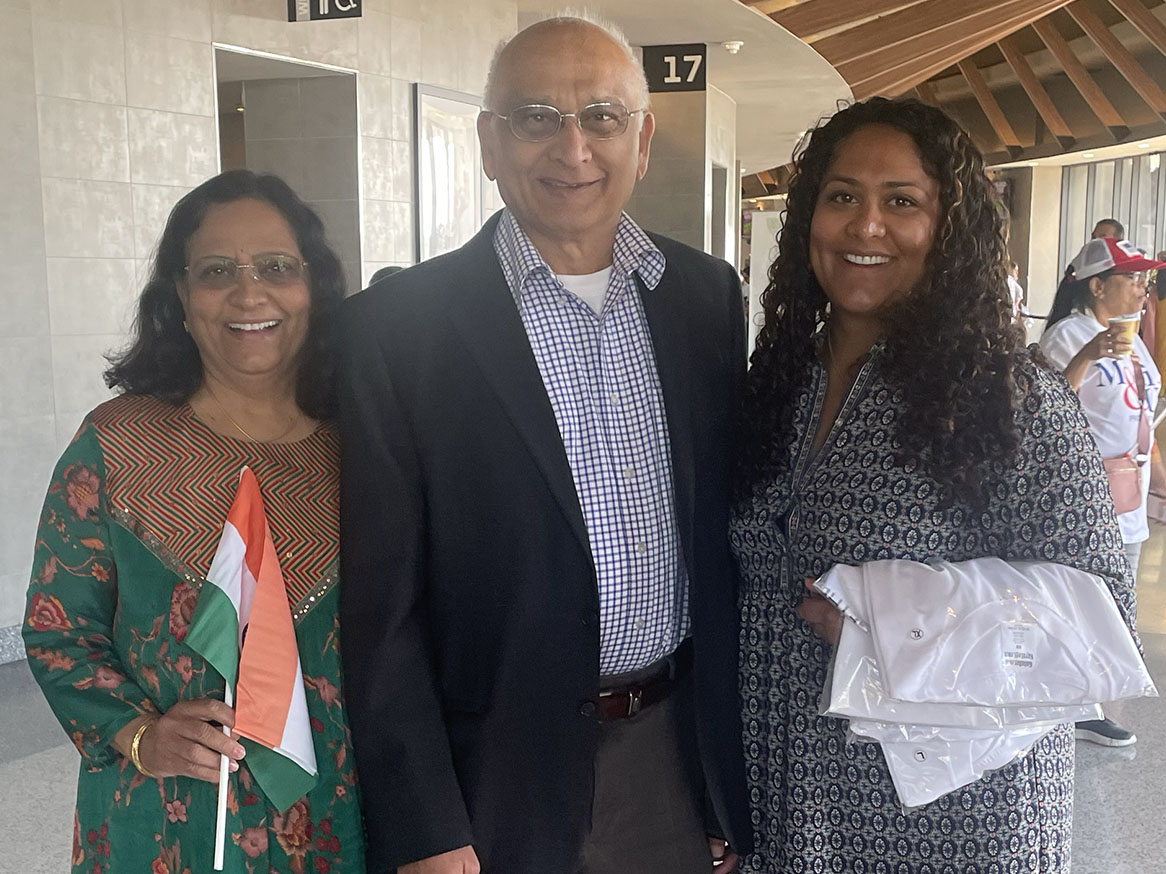NEW YORK (RNS) — Waving both the tri-color Indian flag and the American Stars and Stripes, more than 13,000 people gathered in Long Island on Sunday (Sept. 22) to see and hear Indian Prime Minister Narendra Modi praise the strength of the Indian American community, which, at an estimated 5 million people, is the largest Indian diaspora of any country.
Modi referred to the crowd as “Bharat’s (India’s) strongest brand ambassadors” and projected a growing affectionate bond between the U.S. and India as the world’s oldest and largest democracies, respectively.
“Now our ‘Namaste’ has gone multinational,” he said. “It has gone from local to global, and it is you who has made this possible.”
The “Modi and US” event was sponsored by the nonprofit Indo American Community of USA and held in the Nassau Veterans Memorial Coliseum. The gathering’s theme, “unity in diversity,” drew from the Sanskrit phrase “vasudhaiva katumbakam,” or, “the whole world is one family.”
Speaking in Hindi, Modi congratulated the diaspora for its “unparallelled” skills, talent and commitment to bettering the American nation, including, to uproarious applause, Indian American representation at this year’s T20 cricket world cup. Little to no references to Hinduism, let alone a “Hindu rashtra,” or Hindu nation, were made.
But outside the venue, anti-Modi protests of about 300 faith-led activists converged.
One group of about 50 Hindus, Muslims, Sikhs and Christians highlighted the ways in which they say Modi’s rule has normalized a fiery brand of Hindu supremacy, referred to as “Hindutva,” or “Hinduness,” and facilitated violence against ethnic and religious minorities in India.

Activists of various faith backgrounds hold signs protesting Narendra Modi, outside the Nassau Veterans Memorial Coliseum in Uniondale, N.Y., Sunday, Sept. 22, 2024. (Photo by Rohan Narine/Hindus for Human Rights)
“Modi, Modi, you can’t hide, you’re responsible for genocide,” some chanted, referring to the deadly 2002 anti-Muslim riots in Gujarat, western India, that human rights groups have linked to the Modi administration that governed the state at that time. Signs with “MODI=HITLER, RSS=KKK,” referring to the Hindu nationalist paramilitary group Rashtriya Swayamsevak Sangh seen as formative to Modi’s rise, and “Hindu Dharma is Justice for All,” could be seen among the crowd.
Across a police-installed barricade, a separate protest of almost 300 Sikhs advocated for the creation of Khalistan, a would-be break-away Sikh nation-state in India. There, some took turns using shoes to hit a life-size effigy of Modi. Some held signs with the slogan “Modi: Face of Hindu Terror.” The Modi government has killed several Sikh and Kashmiri separatist activists, whom they label terrorists and extremists, including fatally shooting a Sikh activist in Canada and attempting to assassinate a Sikh activist, an American citizen, in the U.S.
“I don’t agree with the idea of Khalistan for many reasons, although I support everyone’s democratic right to demand self-determination, but I don’t support religious nationalist movements,” said Pieter Friedrich, an anti-Hindutva activist and journalist who was part of the multifaith Reclaim Indian Democracy side of the protest, adding that another bus of around 50 volunteers from New Jersey was unable to make it due to a blockage on the turnpike.
“But the struggle against Hindutva will be successful when we have a full unified intermingling of all communities, across all religions,” he said.

Attendees prepare to enter the Nassau Veterans Memorial Coliseum before the “Modi and US” event in Uniondale, N.Y., Sunday, Sept. 22, 2024. (RNS photo/Richa Karmarkar)
Religious leaders, like Imam Saffet Catovic from prominent religious freedom organization Justice for All, called Modi’s leadership fascist and modeled on Hitler’s regime.
“There is no democracy without the protection of human rights of the minorities of that land,” he said, drawing from his experience with genocide in his home country of Bosnia.
Another activist spoke about the plight of Christians in Manipur, India, where churches have been attacked and more than 60,000 people displaced after hundreds were killed in mob violence this year. Another spoke about Modi’s role in the Gujarat riots, which prompted the U.S. government to ban Modi from visiting the U.S. at that time.
Friedrich, an invited inaugural speaker on behalf of the Federation of Indian American Christians of North America, centered his speech on the “audacity” of Modi’s “rockstar reception,” and the “insult to injury” he adds coming to speak three months after and just miles away from where an Indian national was indicted for the attempted murder of a U.S. citizen.
“From every angle, from the Sikh angle, the Khalistani angle, from the secular, pluralistic angle, we have people who are deeply, deeply offended and wounded as American citizens,” Friedrich told RNS. “That India under Modi would have the audacity to think that they can strip away our legal constitutional rights to freedom of expression here, not in India, but here in America.”
The accused assassination plot of Gurpatwant Singh Pannun, the leader of Sikhs for Justice, has heightened the tensions among some in the diaspora, especially among those who say India has been engaging in “transnational repression” of pro-Khalistani Americans for years.
U.S. security officials have said that the Indian intelligence service under Modi has increasingly surveilled and harassed Sikhs and other groups in the diaspora perceived as disloyal to the Indian government.

A vandalized sign at the BAPS Shri Swaminarayan Mandir Hindu temple in Melville, N.Y. (Photo courtesy BAPS)
But many Hindus blame Khalistani rhetoric for the recent desecration of American Hindu temples across the country, many of which were vandalized with anti-Modi expletives. Just days ago, a BAPS Swaminarayan Mandir nearby in Long Island was spray-painted with pro-Khalistani messages.
While the U.S. and India have agreed on some designations of Islamic terrorism, Sikh extremism has divided them, with the U.S. not formally designating any Khalistani group as a terrorist organization despite violent attacks like the 1985 bombing of an Air India flight en route from Canada to India that killed more than 300 people. Canadian authorities believe the attack was orchestrated by Sikh separatists.
Suhag Shukla, executive director for the Hindu American Foundation, was inside the rally venue during the protests. Though freedom of expression and peaceful protests are “very critical to a democracy,” she said, Shukla thinks it is an unfair assessment to characterize Modi’s visit as problematic, instead choosing to focus on the diplomatic value of the event, and of the countries’ “natural, necessary and inevitable friendship.”
“What I think is dangerous for a democracy is demonizing entire communities, demonizing organizations, and, you know, publishing lies,” she told RNS. “If we truly are committed to secular democracy, as Americans, we need to be nuanced and transparent about understanding one another rather than making assumptions about one another.”

Hemlata, left, and Arvind Bhakta with their daughter, Darshna, at the Nassau Veterans Memorial Coliseum in Uniondale, N.Y., Sunday, Sept. 22, 2024. (RNS photo/Richa Karmarkar)
For many of those who waited hours in lines and traffic to attend the rally, Modi is a national hero who has helped spread Indian culture abroad. Some described themselves as “Modi superfans.” The multigenerational Bhakta family of Pennsylvania, for example, has followed Modi’s rise since his humble beginnings as a tea seller in their home state of Gujarat.
“My mother-in-law took an oath that until he (Modi) became Chief Minister, she’s not going to eat rice,” said Hemlata Bhakta, whose family has personally met with Modi twice. “She didn’t eat rice for that year.”
Yet many Hindus still believe the protests against Modi are part of a larger American progressive movement that stands against any foreign intimidation, said Rohan Narine, New York-based organizer for Hindus for Human Rights, a progressive Hindu advocacy group that has been vocal about their opposition to the Indian prime minister.
“We’re calling on all Americans to recognize the harmful and growing presence of Hindutva organizations right here in the United States,” he told RNS. “We say emphatically that Hindutva apologizers such as Modi and his supporters are not welcome here in New York, and they’re not welcome in Long Island and not welcome here in the United States.
“I would say for Indian diaspora liberals who are very small in numbers, the fight is always against the tide for us, always like salmon swimming upstream,” he added.
As Modi closed his address, chants of “Modi” and “Bharat Mata ki Jai,” or “Hail the motherland,” filled the sold-out stadium.

